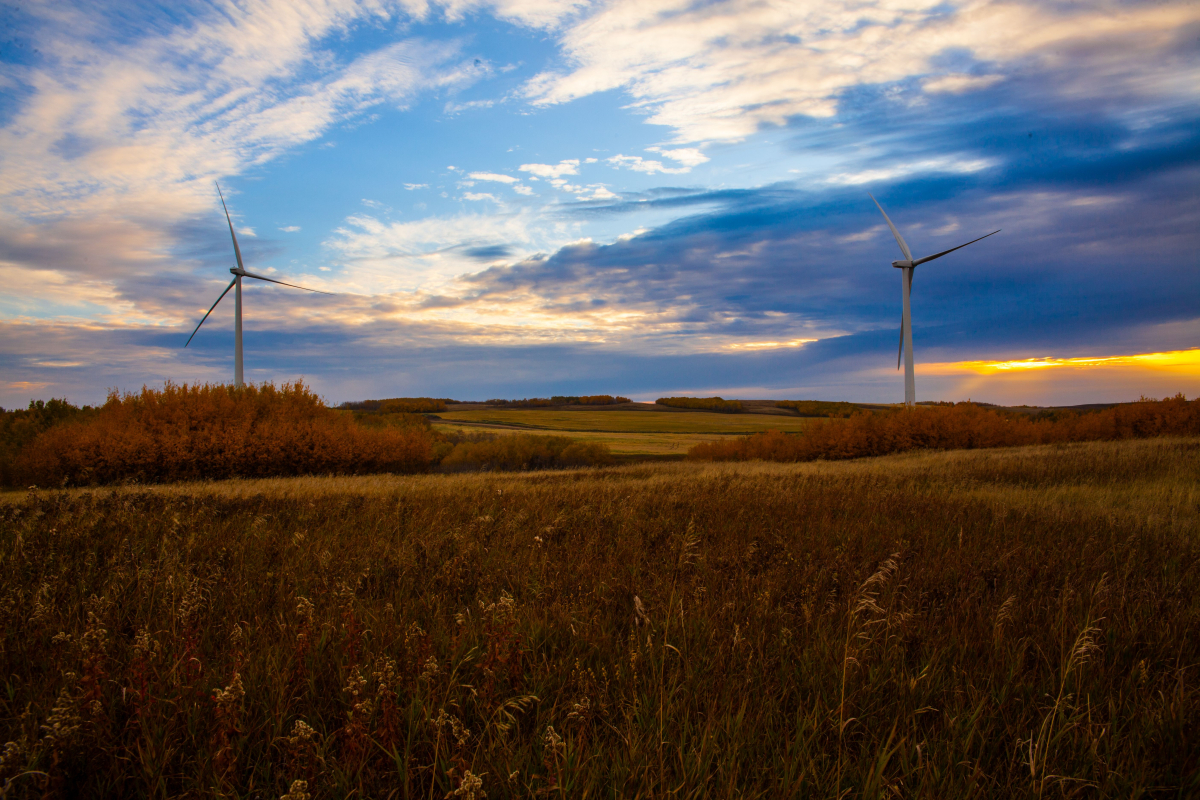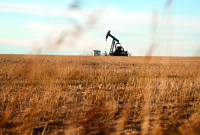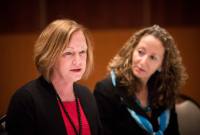Support strong Canadian climate journalism for 2025
Arman Mottaghi works in sustainable energy and spends a lot of his time looking at energy data. He’s noticed misinformation about energy being shared online.
“There is a gap between research being done and what the everyday Canadian is seeing,” he said. As an owner of a sustainable-energy business and a board member of the British Columbia Sustainable Energy Association (BCSEA), he often sees research taken out of context or people sharing outdated information.
BCSEA has even begun a social media campaign to address misinformation around energy and climate science.
That’s why Mottaghi was excited to hear the federal government is launching a website called the Canadian Energy Information Centre, which Natural Resources Minister Amarjeet Sohi announced on Aug. 26. The "independent, one-stop website" will collect energy data from across the country and plug it into a standardized system to provide "comprehensive energy information."
The federal data centre has the same name as that used by the Canada's largest oil and gas lobby group — Canadian Association of Petroleum Producers — for an in-house information centre designed in 2002 to provide industry-funded information about oil and gas on their website, which includes maps of energy use and production and live feeds of global petroleum prices.
A Natural Resources Canada spokesperson said CAPP dropped this initiative in 2013 due to inactivity, but did not answer questions about why the government chose the same name, adding that Statistics Canada is “ideally suited as a non-partisan public service institution” to develop an independent energy information system.
Experts agree. Right now, energy data is scattered across several different organizations in Canada, including CAPP, the Canadian Energy Regulator (formerly known as the National Energy Board), Natural Resources Canada, the Ministry of Environment and Climate Change, Statistics Canada and provincial energy boards.
This is a problem, according to Pierre-Olivier Pineau, an energy professor at HEC Montreal: Canada — the fifth-largest energy producer and one of the highest consumers of energy in the world — has “no central, authoritative source of data that everyone agrees on, and that can be easily referred to, with some trusted methodology.”
“We do have data, but it's all over the place. And many times, it is inconsistent, not transparent and not fully trusted,” he added. “And when we try to get statistics on the sector — who's consuming? How much do we consume? What are the prices — it is very hard to find this information.”
That's why members of the energy sector — everyone from environmentalists to oil and gas workers to energy researchers — are cautiously celebrating the Liberals’ commitment of $15.2 million over five years to the data centre.
The idea of a Canadian Energy Information Centre represents the “one thing you can get every organization that works in energy to agree on: that energy statistics in Canada need a lot of work,” Richard Carlson, director of energy policy at Pollution Probe, said in an interview. “There is universal agreement on this.”
In fact, the centre comes after “years and years of complaints” by all these groups, he added.
“We’ve all been asking for this forever.”
'Vague' but 'a good first step'
The Canadian Energy Information Centre was first proposed in May 2017 as a recommendation in the federal government’s National Energy Board Modernization Expert Panel Report. At the time, the vision included "a new, independent Canadian Energy Information Agency, separate from both policy and regulatory functions, accountable for providing decision-makers and the public with critical energy data, information and analysis.”
In a recent release, Sohi said that the need to improve energy information in Canada "was recognized by the Generation Energy Council, which proposed pathways for the Government of Canada to move forward toward a strong, clean energy economy."
"The Canadian Centre for Energy Information will provide Canadians with independent, complete and high-quality energy information to inform their decisions. It will also enhance competitiveness, international trade and investment," he said.
The federal government's recommendation was to create something equivalent to the U.S. Energy Information Administration (USEIA), a non-partisan, independent governmental organization that is highly trusted and constantly updated, and considered “a gold standard” in energy data, according to many.
In fact, the USEIA’s data on Canada’s energy sector “is better than what you get in Canada, which is somewhat embarrassing,” Carlson said.
In comparison to the USEIA, Canada’s proposal is “vague” but “a good first step” in creating a collation tool for all of Canada’s energy data and then improving on it, Carlson said.

Right now, energy data is very disaggregated and there is no way of putting it together easily, Carlson explained. For example, Statistics Canada and the Ontario government share no agreed-upon definitions or methodology for measuring solar power, Carlson said. There is also no data on natural-gas storage in Canada.
Another irony, according to Pineau, is that the best current source of electricity prices in Canada is Hydro Quebec, which he said “is not acceptable.”
And then there are the inconsistencies: according to Statistics Canada, emissions have been decreasing slowly in Canada’s transportation sector over the past 10 years. Yet StatsCan also shows that the sale of oil products — the primary sources of emissions in the transportation sector — are increasing.
Additionally, Statistics Canada does not presently count biomass as a source of energy in Canada, but the International Energy Agency in Paris has statistics showing its usage in Canada.
“How can we have biomass information about our country from an international organization based in Paris, and we don't find it in the energy data from Statistics Canada?” Pineau asked. “It doesn’t make sense.”
Pineau applies the same logic to CAPP being one of the few reliable sources of energy information in the country. While they have been consistent in gathering energy data from their members and documenting it well, they are not universally seen as trustworthy.
“Greenpeace will not go to CAPP’s website to get statistics... because of the appearance of the conflict of interest,” Pineau said. “There is something wrong about the fact that energy data is coming from an CAPP and not from the government.”
CAPP replied to phone and email requests about their energy-data collection with an unsigned email saying, “We do not respond to media requests from the National Observer."
Data needed for 'effective' clean-energy transition
In an interview, Greg Peterson, an assistant chief statistician for Statistics Canada, acknowledged that there were problems with energy-data collection in Canada, noting that provinces and territories also measure energy use and distribution differently, which can make it harder to get the whole picture.
To correct this, Statistics Canada plans to work with provincial ministries to establish standardized measurements that can then be shared on the website, he said.
But, since the website is still in its development stages, it’s not clear exactly what data will be available in what form. Peterson said the website will broadly will collect information about energy use and distribution.
He said Statistics Canada also hopes it will lead to more comprehensive data about renewable energy use, which hasn’t been analyzed as closely as other industries since it hasn’t contributed as much to the country’s gross domestic product.
Peterson also said they hope to aggregate information about energy with other data, to see how the renewable energy sector is affecting other industries, jobs and socio-economic factors like health.
Experts are welcoming this approach, but say that it could be improved significantly.
Teresa Scassa, the Canada Research Chair in Information Law and Policy at the University of Ottawa, said that the proposed energy-data centre was “quite innovative in terms of bringing together the energy sector in a way that hasn't been done before.”
“It’s ambitious, and I think quite important,” Scassa said in an interview, because it will mean that the many different groups and stakeholders in the energy sector will need to work together to apply rigorous methodologies to the data to make it useful and interoperable “so that it can actually be used to generate meaningful, high-quality knowledge.”
“We now recognize the more data you have — the more quality data you have — the better decisions you can make, the more you understand the situation, the more you can react to things as they are developing,” she said.
Mottaghi said he thinks a central, reliable source of data may help address disinformation, though he says it’s too early to tell exactly who will benefit.
“It depends how the information is presented, whether in macro or micro scale,” he said. If it is at provincial or federal levels, he said, “it may not relate to the individual.” But, he says, if the website included median salaries for people in renewable energy, that could be more helpful for everyday people.
Peterson says this data will also give insight into Canada’s transition to renewable energy.
For example, as the Liberals pursue their plan to move coal workers into renewable energy, Peterson says Statistics Canada hopes the centre can help analyze the economic and social effects of that transition.
Carlson says this is important because as the energy sector in Canada changes rapidly, data is needed to help the country decide, “What is the most effective way of making an energy transition?”
“It’s hard for companies to know where to innovate if they don’t have the data,” Carlson said. “It's hard for us to know where we're going to go if you don't know where we are. And by the by, not having good data, it's hard for us to know where we are.”
Data needed to 'depoliticize' energy debate
Ultimately, reliable and trusted data from a central source will also help “depoliticize some of the energy debates in Canada by having an agreed set of facts,” Carlson said.
“If the information is available and out there and clear, then people understand what's going on, and then people will support a particular viewpoint,” he said. “So from CAPP’s position, if they can come out and say, ‘Look how important oil and gas is to the Canadian sector. Here’s some independent information. Look how important oil and gas development is to GDP,’ then people may be more likely to support oil and gas development in Canada.”
As Canada gears up for a federal election where energy, climate change, oilsands and pipelines will be major issues, onlookers wonder if this centre will survive a change in government.
“Energy discussions are very important across Canada, so we need a trusted source of data, to which people from all sides can refer to and say: well look, this is the data. It's easy to see and it's easy to find and here’s what it says,” Pineau said. “This way, we don’t waste our time arguing about the amount of emissions we have, how much energy we’re consuming, if we need more oil, or how much is transported by train or pipeline.”
Natural Resources Canada was not able to answer National Observer by deadline on whether a change in government could risk the funding for this project.
But, for now, Statistics Canada has launched a beta website based on feedback, with the government hoping to launch a full-functioning website within a year. Peterson said the most common requests so far were more data on renewable energy, and for Statistics Canada to share updated data more quickly.

Mottaghi said that timeliness is an important improvement. He said when he is researching data relevant to his business, he sometimes only finds data several years old that can make him wonder if it’s “still relevant.”
Mottaghi also said he’d like to see a function where everyday people can contribute their own data visualizations (with the necessary verification and oversight from Statistics Canada) to make it more interactive and dynamic.
“Community engagement is a very big part of it. I hope an open-source paradigm is incorporated… and the community is involved every step of the way,” he said.
Pineau wishes there was permanent funding for the Canadian Energy Information Centre, to ensure that Canada will always have a strong energy sector “that inspires the world.”
“Energy will be important for as long as humans are on earth,” he said. "And as long as Canada exists, there will be a need to have some strong energy data."








Comments
In theory the energy information centre is an essential component in the aggregation and presentation of the data. Its perhaps fatal weakness lies in the curating of the information gathered. Who will determine or analyze and contextualize the data?
This is not a frivolous question. Everything depends on honest interpretation.